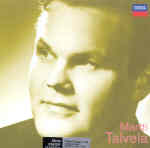It’s hard to realize that it’s been more than a dozen years since the death of Finnish bass Martti Talvela, so vividly does his resonant voice and authoritative stage demeanor live on in the memory. Built like an NFL tackle–6’7″ and 300 pounds–his imposing presence made for impressive Boris Godunovs, Sarastros, Hagens, and other operatic heroes and villains. He also was a compelling song recitalist, especially in the Russian repertoire, and while it’s disappointing that Decca hasn’t included some of his best opera roles in this “The Singers” entry, it’s good to be reminded of his skills in this most intimate sphere of music.
More than half the disc is devoted to Schumann’s Zwölf Gedichte Op. 35, where his huge voice sometimes smothers the songs. He does hone his tone down with some success, though the familiar “Stille Tränen”, a soprano song, becomes something of a mugging victim. Others come off better, much better in the case of “Wanderlied”, where his big voice fits the forceful rhythms well. In the song’s gentler central section, his earnest, yearning quality wins the day, as it does in “Erstes Grün” and in “Alte Laute”, all the more moving for its hushed singing and the realization that behind those gentle half-tones lies a huge power reserve held in check. So despite a misfire or two and an obvious lack of complete identification with the idiom, Talvela’s Schumann is worth hearing.
No such reservations apply to the Russian selections. Mussorgsky’s Songs and Dances of Death won’t erase memories of Boris Christoff, but Talvela here runs the gamut of the four songs’ varied emotions and subtleties. He’s mercurial in “Lullaby”, grimly seductive in “Serenade”, conveys the ominous quality of the dance in “Trepak”, and lets loose with all the firepower of his huge voice in “The Field Marshall”. He ends The Flea with the mother of all laughs, preceded by some of the richest deep bass tones you’d ever want to hear. A quartet of Rachmaninov songs completes the disc, well chosen to demonstrate the singer’s range, vocal gifts, and dramatic skills.
Irwin Gage is an alertly sensitive partner in the 1969 Schumann. Ralf Gothoni, the pianist in the 1980 Russian songs, is superb as the keyboard equivalent of Talvela’s committed singing–dynamic and powerful in the Mussorgsky cycle and caressingly gentle in Rachmaninov’s Night is Mournful. Voice/piano balances are fine and the sound has plenty of presence. While I hate to repeat my complaints every time a “The Singers” disc comes my way, duty obligates me to remind you that texts and translations can only be accessed via your computer’s CD drive. That aside, this is one of the more attractive releases of the series thus far.
































